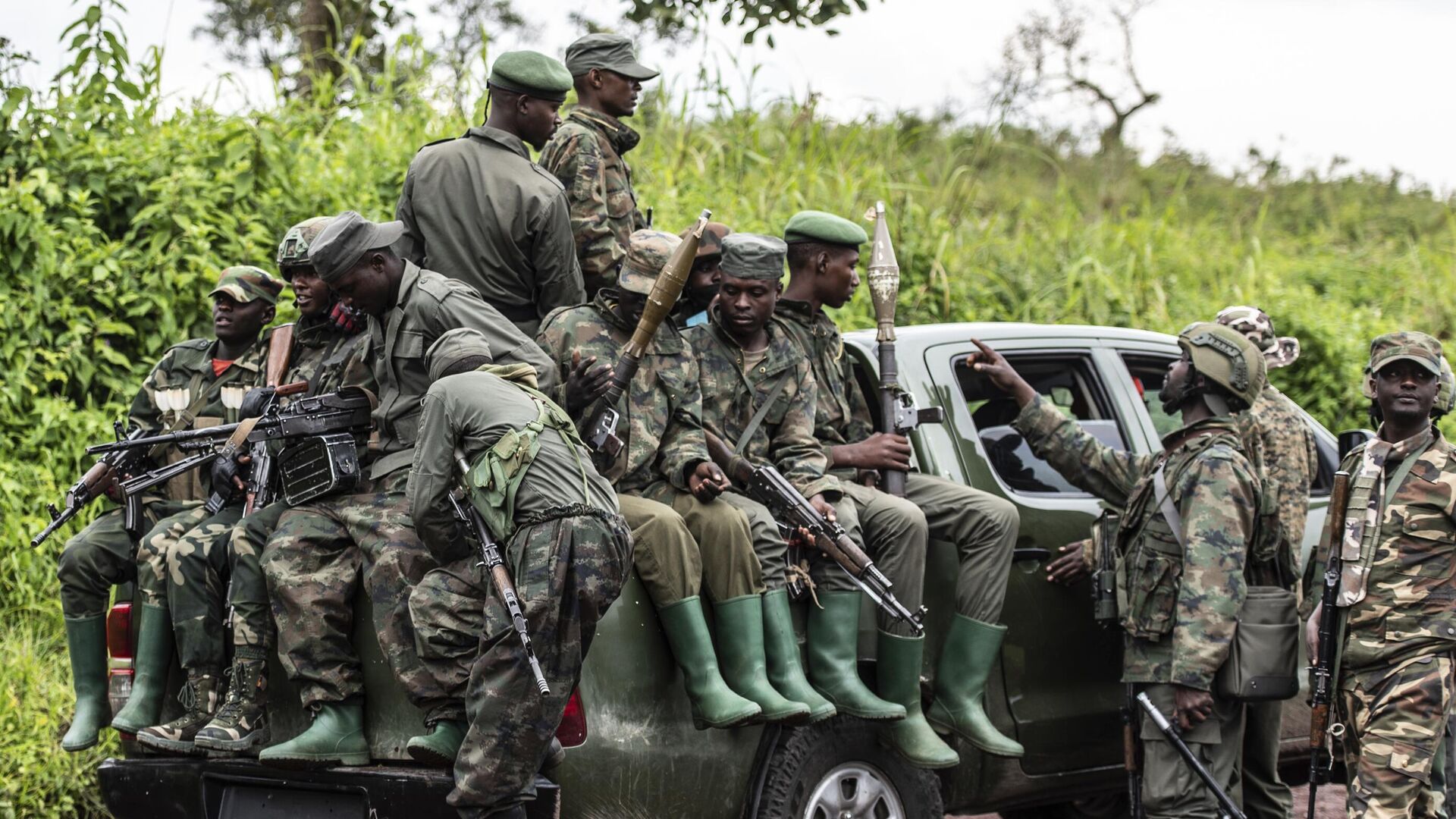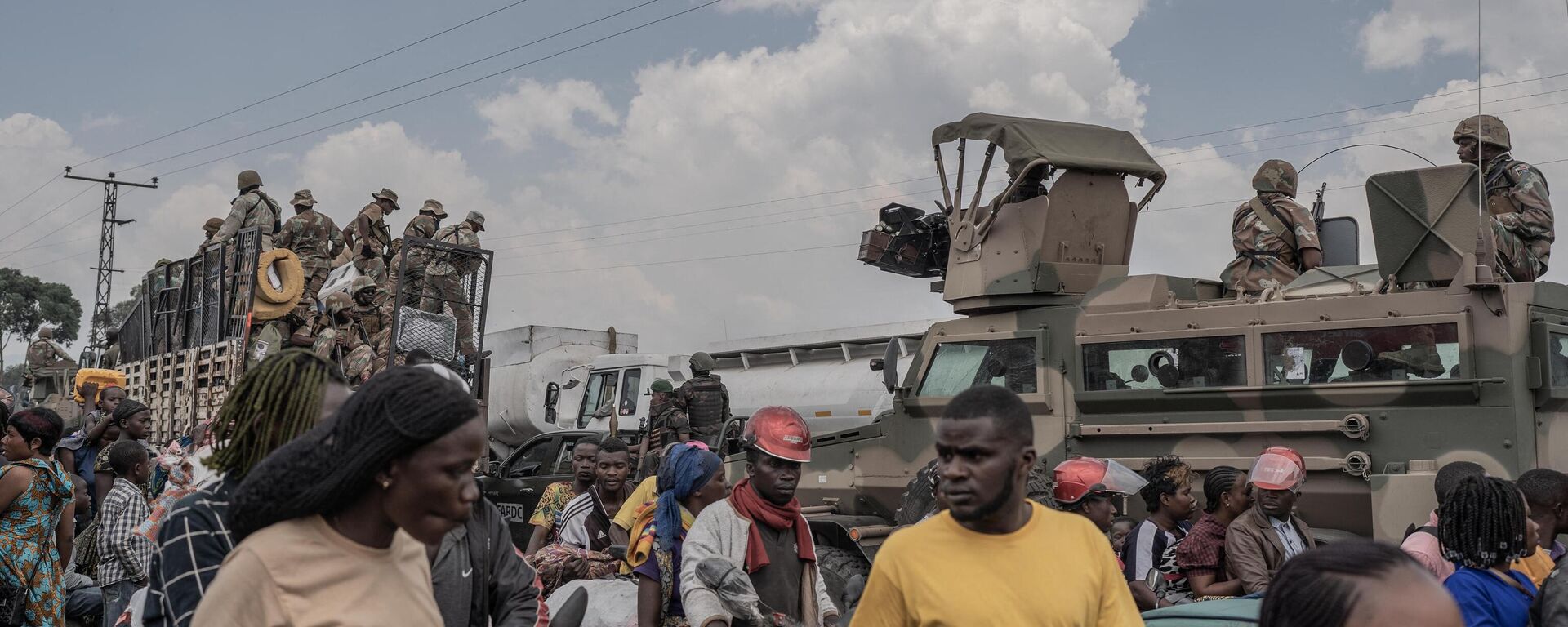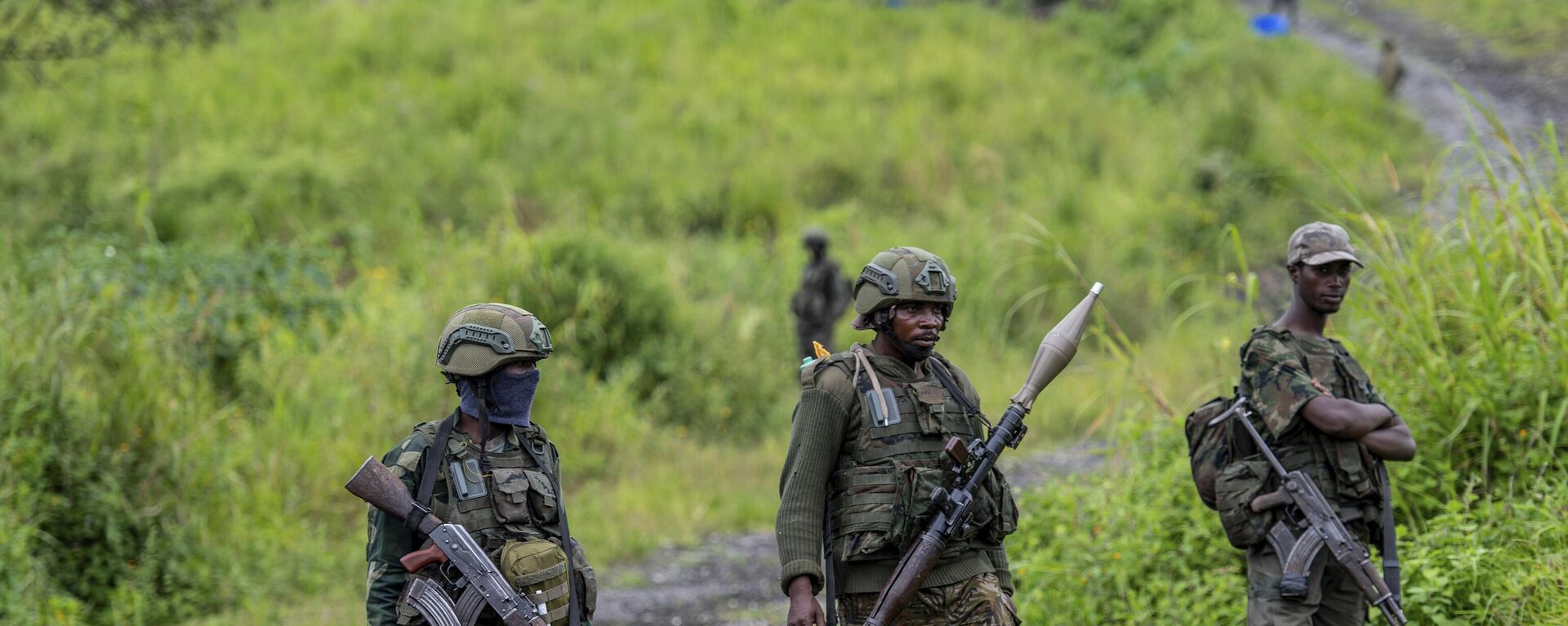https://en.sputniknews.africa/20240225/what-is-frances-role-in-eastern-drc-conflict--tensions-with-rwanda-1065237633.html
What is France's Role in Eastern DRC Conflict & Tensions With Rwanda?
What is France's Role in Eastern DRC Conflict & Tensions With Rwanda?
Sputnik Africa
Fighting in the east of the Democratic Republic of Congo (DRC) between government forces and rebels of the March 23 Movement (M23), composed mainly of ethnic... 25.02.2024, Sputnik Africa
2024-02-25T11:26+0100
2024-02-25T11:26+0100
2024-05-08T18:38+0200
sub-saharan africa
conflict
france
democratic republic of the congo (drc)
rwanda
m23 rebels
tensions
east africa
central africa
africa in details
https://cdn1.img.sputniknews.africa/img/07e8/02/19/1065238285_0:0:2785:1568_1920x0_80_0_0_b7d3909bcce2c7b3b1543e81853e8e03.jpg
Paris has recently accused Rwanda, run by a mostly Tutsi government, of supporting the rebels in neighboring DR Congo. Kigali denied the allegations, adding that "nobody knows the causes and history" of the conflict better than France. Sputnik Africa takes a look at Paris's role in this situation, whose roots go back to the 1994 genocide of Tutsis in Rwanda, carried out by ethnic Hutus.France & the "Génocidaires"France was accused of supporting the Hutu government. François Mitterrand, the French president at the time, had a close relationship with his Rwandan counterpart, Juvénal Habyarimana. In addition, some reports indicate that Paris also supplied arms to the Hutu authorities. In this way, the French government prevented the advance of the Rwandan Patriotic Front (RPF), which was formed by the Tutsis.Officially, the deployment of French forces in southwestern Rwanda was authorized by the UN on June 22, 1994, as part of Operation Turquoise, more than two months after the massacres began.However, some observers later argued that French aid arrived too late and that some of the genocide perpetrators had managed to find refuge in the humanitarian zone set up by the French authorities.Moreover, during the evacuation of the génocidaires, the French troops forbade the Tutsis to follow them. Tutsis from mixed marriages were not allowed to leave the country, but the French authorities rescued several senior members of President Habyarimana's government and his widow, Agathe. The latter now lives in France and is accused by the Rwandan authorities of complicity in the genocide. An international arrest warrant has been issued for her.The massacres, which claimed more than 800,000 lives, came to an end when the Hutu elite was ousted by the Rwandan Patriotic Front (RPF), a Tutsi political party. Its leader, Paul Kagame, has been president of Rwanda since 2000.Flame Still BurnsTo avoid reprisals, many Hutus fled to neighboring DRC, including many former Hutu leaders implicated in the genocide. They formed the Democratic Forces for the Liberation of Rwanda (FDLR), a military group with ambitions to overthrow Paul Kagame in Rwanda.Meanwhile, eastern DRC became home to thousands of Tutsi genocide survivors. There, interethnic conflict became one of the causes of the two Congolese wars that ended in 2003.Later, the M23 movement, a key player in the conflicts in the provinces of North Kivu and South Kivu in eastern DRC, was formed there, with a large majority of its members being Tutsis.Kigali accuses Kinshasa of supporting the FDLR, while DRC leader Felix Tshisekedi points the finger at Rwanda's alleged support for the M23. Many also denounce the alleged support of Western powers.He stressed that the DRC is "alone in this war" that has killed and displaced millions of Congolese.Since 2021, the rebels have managed to seize several localities in the province of North Kivu. Their goal now is to take control of Goma, the region's capital.Paris' Controversial PositionIn April 2021, French President Emmanuel Macron acknowledged for the first time his country's responsibility in the genocide against the Tutsi in Rwanda. This statement followed the conclusions of a report by a French commission on these events. According to the document, Paris bears "heavy and overwhelming responsibilities" in the genocide, but this does not mean that it was complicit in the genocide.However, Emmanuel Macron denies any responsibility for the current situation in the DRC, plagued by the hostilities in its eastern regions. He even accused the authorities of being unable to guarantee security:
https://en.sputniknews.africa/20240222/rwanda-refutes-allegations-by-france-of-supporting-m23-rebels-in-dr-congo-1065199562.html
https://en.sputniknews.africa/20240219/ongoing-conflict-in-dr-congo-becoming-threat-to-rwandas-national-security-foreign-ministry-says-1065153327.html
france
democratic republic of the congo (drc)
rwanda
east africa
central africa
paris
Sputnik Africa
feedback@sputniknews.com
+74956456601
MIA „Rossiya Segodnya“
2024
Muhammad Nooh Osman
https://cdn1.img.sputniknews.africa/img/07e7/04/0a/1058467512_0:0:1280:1280_100x100_80_0_0_ec723833bcbfcaed2e21952965ad99e4.jpg
Muhammad Nooh Osman
https://cdn1.img.sputniknews.africa/img/07e7/04/0a/1058467512_0:0:1280:1280_100x100_80_0_0_ec723833bcbfcaed2e21952965ad99e4.jpg
News
en_EN
Sputnik Africa
feedback@sputniknews.com
+74956456601
MIA „Rossiya Segodnya“
Sputnik Africa
feedback@sputniknews.com
+74956456601
MIA „Rossiya Segodnya“
Muhammad Nooh Osman
https://cdn1.img.sputniknews.africa/img/07e7/04/0a/1058467512_0:0:1280:1280_100x100_80_0_0_ec723833bcbfcaed2e21952965ad99e4.jpg
conflict, france, democratic republic of the congo (drc), rwanda, m23 rebels, tensions, east africa, central africa, africa in details, paul kagame, paris, genocide, massacre, felix tshisekedi, emmanuel macron, united nations (un)
conflict, france, democratic republic of the congo (drc), rwanda, m23 rebels, tensions, east africa, central africa, africa in details, paul kagame, paris, genocide, massacre, felix tshisekedi, emmanuel macron, united nations (un)
What is France's Role in Eastern DRC Conflict & Tensions With Rwanda?
11:26 25.02.2024 (Updated: 18:38 08.05.2024) Muhammad Nooh Osman
Writer/Editor
Fighting in the east of the Democratic Republic of Congo (DRC) between government forces and rebels of the March 23 Movement (M23), composed mainly of ethnic Tutsis, has been going on since 2011. The first serious clashes took place between 2012 and 2013.
Paris has recently accused Rwanda, run by a mostly Tutsi government, of supporting the rebels in neighboring DR Congo. Kigali denied the
allegations, adding that "nobody knows the causes and history" of the conflict better than France.
Sputnik Africa takes a look at Paris's role in this situation, whose roots go back to the 1994 genocide of Tutsis in Rwanda, carried out by ethnic Hutus.
France & the "Génocidaires"
France was accused of supporting the Hutu government. François Mitterrand, the French president at the time, had a close relationship with his Rwandan counterpart, Juvénal Habyarimana. In addition, some reports indicate that Paris also supplied arms to the Hutu authorities. In this way, the French government prevented the advance of the Rwandan Patriotic Front (RPF), which was formed by the Tutsis.
Officially, the deployment of
French forces in southwestern Rwanda was authorized by the UN on June 22, 1994, as part of Operation Turquoise, more than two months after the massacres began.
However, some observers later argued that French aid arrived too late and that some of the genocide perpetrators had managed to find refuge in the humanitarian zone set up by the French authorities.
Moreover, during the evacuation of the
génocidaires, the French troops forbade the Tutsis to follow them. Tutsis from mixed marriages were not allowed to leave the country, but the French authorities rescued several senior members of President Habyarimana's government and his widow, Agathe. The latter now lives in France and is
accused by the Rwandan authorities of complicity in the genocide. An international arrest warrant has been issued for her.
The massacres, which claimed more than 800,000 lives, came to an end when the Hutu elite was ousted by the Rwandan Patriotic Front (RPF), a Tutsi political party. Its leader, Paul Kagame, has been president of Rwanda since 2000.
To avoid reprisals, many Hutus fled to neighboring DRC, including many former Hutu leaders implicated in the genocide. They formed the Democratic Forces for the Liberation of Rwanda (FDLR), a military group with ambitions to overthrow Paul Kagame in Rwanda.
Meanwhile, eastern DRC became home to thousands of Tutsi genocide survivors. There, interethnic conflict became one of the causes of the two Congolese wars that ended in 2003.
Later, the M23 movement, a key player in the conflicts in the provinces of North Kivu and South Kivu in eastern DRC, was formed there, with a large majority of its members being Tutsis.
Kigali accuses Kinshasa of supporting the FDLR, while DRC leader Felix Tshisekedi points the finger at Rwanda's alleged support for the M23. Many also denounce the alleged
support of Western powers.
"It's the West that's behind this, because it's impossible for Rwanda to maintain the war in our country for these many years [...]. It's certainly the West that is supplying arms and all the military aid," explained Dieudonné Mushagalus, national coordinator of the DRC Panel of Civil Society Experts.
He stressed that the DRC is "alone in this war" that has killed and displaced millions of Congolese.
Since 2021, the rebels have managed to seize several localities in the province of North Kivu. Their goal now is to take control of Goma, the region's capital.
Paris' Controversial Position
In April 2021, French President Emmanuel Macron acknowledged for the first time his country's responsibility in the genocide against the Tutsi in Rwanda. This statement followed the conclusions of a report by a French commission on these events. According to the document, Paris bears "heavy and overwhelming responsibilities" in the genocide, but this does not mean that it was complicit in the genocide.
"Nevertheless, for a long time, France was involved with a regime that encouraged racist massacres... It remained blind to the preparation of a genocide by the most radical elements of this regime," the document reads.
However, Emmanuel Macron denies any responsibility for the current situation in the DRC, plagued by the hostilities in its eastern regions. He even
accused the authorities of being unable to guarantee security:
"Since 1994, and it is not France's fault, you have not been able to restore the sovereignty, neither military, nor security, nor administrative, of your country. This is a fact. There's no need to look for someone else to blame," he said during his African tour in March 2023.




